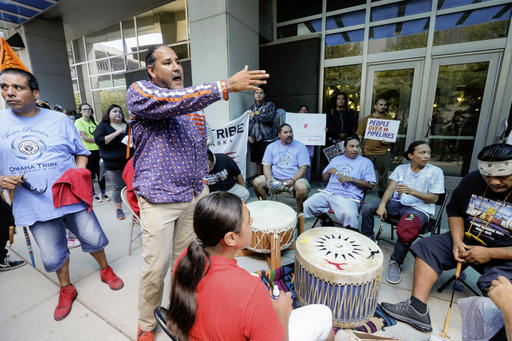NEAR THE STANDING ROCK SIOUX RESERVATION, N.D. (AP) — The Standing Rock Sioux Tribe’s attempt to halt construction of the four-state Dakota Access oil pipeline near their North Dakota reservation was denied Friday by a federal judge.
The tribe had challenged the Army Corps of Engineers’ decision to grant permits at more than 200 water crossings for Dallas-based Energy Transfer Partners’ $3.8 billion pipeline, saying that the project violates several federal laws, including the National Historic Preservation Act, and will harm water supplies. The tribe also says ancient sacred sites have been disturbed.
U.S. District Judge James Boasberg in Washington denied the tribe’s request for a temporary injunction in a one-page ruling that included no explanation. It ordered the parties to appear for a status conference on Sept. 16.
Attorney Jan Hasselman with environmental group Earthjustice, who filed the lawsuit in July on behalf of the tribe, said in the days before the ruling that it’ll be challenged.
“We will have to pursue our options with an appeal and hope that construction isn’t completed while that (appeal) process is going forward,” he said. “We will continue to pursue vindication of the tribe’s lawful rights even if the pipeline is complete.”
Energy Transfer Partners officials didn’t return The Associated Press’ phone calls or emails seeking comment.
The 1,172-mile project will carry nearly a half-million barrels of crude oil daily from North Dakota’s oil fields through South Dakota and Iowa to an existing pipeline in Patoka, Illinois.
Thousands from tribes across the country have joined the protest over the pipeline, which will cross the Missouri River near the Standing Rock Sioux reservation in southern North Dakota.
State authorities announced this week that law enforcement officers from across the state were being mobilized at the protest site, some National Guard members would work security at traffic checkpoints and another 100 would be on standby. The Great Plains Tribal Chairman’s Association has asked the federal Justice Department to send monitors to the site because it said racial profiling is occurring.
Nearly 40 people have been arrested since the protest began in April, including tribal chairman Dave Archambault II, though none stemmed from Saturday’s confrontation between protesters and construction workers.
Tribal officials said workers allegedly bulldozed sites on private land that Hasselman said in court documents was “of great historic and cultural significance.” Energy Transfer Partners denied the allegations.
Four private security guards and two guard dogs were injured, officials said, while a tribal spokesman said six people — including a child — were bitten by the dogs and at least 30 people were pepper-sprayed.
On Thursday, North Dakota’s archaeologist said that piece of private land was not previously surveyed by the state would be surveyed next week and that if artifacts are found, pipeline work could cease.
The company plans to have the pipeline completed this year. In court papers, ETP said stopping the project would cost it $1.4 billion the first year, mostly due to lost revenue in hauling crude.
“Investor appetite for the project could shift and financing may no longer be available,” the company said. “Construction of the entire project would cease and the project itself would be jeopardized.”
Copyright 2016 The Associated Press. All rights reserved. This material may not be published, broadcast, rewritten or redistributed.







And the Obama Administration steps in to save the day ! —
I wanted to revive this thread due to the utter lack of attention this situation has received in relationship to other important news here on the TPM main page and in The Hive. There has been just a single article by TPM staff on the issue. Dakota Access Pipeline Construction to Continue
No mention of Amy Goodman’s arrest and subsequent trial for rioting here. Nothing on the very heavy handed police treatment of protesters. These are issues in general that TPM has most always found to be compelling stories in the past. I understand we are in the midst of a Presidential election, but the dearth of coverage on the Dakota pipeline and the growing protests in light of the acquittal of the the Vanilla Isis crew is disconcerting.
I would love to hear others thoughts on the issue.